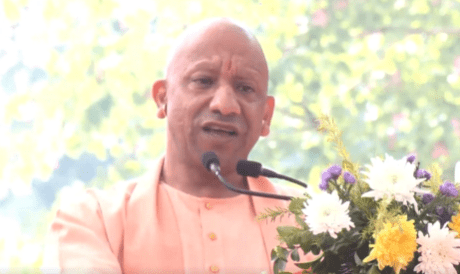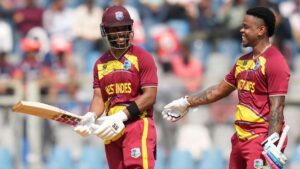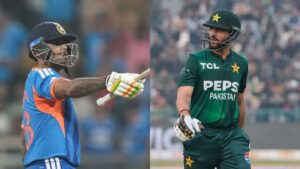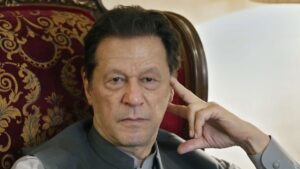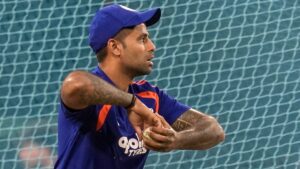Uttar Pradesh Chief Minister Yogi Adityanath on Monday said that singing Vande Mataram will be made compulsory in all educational institutions in the state, asserting that “we must identify and act against those who weaken our unity so that no other ‘Jinnah’ can ever rise to challenge India’s integrity.”
Announcing the move during a Janta Darshan at the Gorakhnath temple in Gorakhpur, he said, “There’s no point in opposing Vande Mataram,” adding that opposition to it was one of the reasons behind India’s partition.
India is marking the 150th anniversary of Vande Mataram with year-long events from November 7, 2025 to November 7, 2026.
The timing has drawn criticism from opposition parties, who accuse the BJP of using the anniversary to further its cultural nationalism agenda and create religious polarisation.
Vande Mataram, written by Bankim Chandra Chatterjee in 1875 and first published on November 7 that year before later appearing in his 1882 novel Anandamath, personifies India as a mother and invokes Hindu goddesses like Durga, Lakshmi, and Saraswati in several of its stanzas.
In 1937, at the Faizpur session, the Congress decided to use only the first two stanzas of Vande Mataram for national occasions after leaders like Jawaharlal Nehru argued that the later verses, which referenced Hindu deities, were unacceptable to sections of the Muslim community.
Letters exchanged between Nehru and Subhas Chandra Bose at the time show concerns that the song’s background could “irritate” Muslims.
Now the song has now become a political flashpoint, with the BJP alleging that the Congress insulted Vande Mataram in 1937 by adopting only the first two stanzas as the National Song.
Prime Minister Narendra Modi, who recited the full hymn at an event on Friday, said the Congress had “broken and torn apart” the poem.
He also unveiled commemorative stamps and a coin, and a dedicated digital portal at the event.
Party president Mallikarjun Kharge said it was ironic for the BJP and RSS to claim ownership of nationalism when they had “never sung Vande Mataram.”
Congress MP Jairam Ramesh cited documents from the 1937 Congress Working Committee, noting that the decision to limit the hymn was influenced by Rabindranath Tagore.
“The Congress Working Committee met in Kolkata October 26-November 1 1937. Those present included Mahatma Gandhi, Jawaharlal Nehru, Sardar Patel, Netaji Subhas Chandra Bose, Rajendra Prasad, Maulana Abul Kalam Azad, Sarojini Naidu, J.B. Kripalani, Bhulabhai Desai, Jamnalal Bajaj, Narendra Deva, and others.The Collected Works of Mahatma Gandhi Vol 66 Page 46 reveals that on October 28, 1937, the CWC issued a statement on Vande Mataram. This statement had been profoundly influenced by Gurudev Rabindranath Tagore and his advice,” he said.
According to excerpts from the book, screenshots of which were shared by Ramesh on X, “Upon being consulted, Rabindranath Tagore’s advice was threefold. While the first two stanzas were entirely acceptable to Rabindranath, he could not sympathise with the sentiments in the latter stanzas.”
He noted that “he should have done so is shocking but not surprising since the RSS had played no role in our Freedom Movement led by Mahatma Gandhi.”
He accused the Prime Minister of attacking historical leaders rather than addressing present-day issues like unemployment, inequality, and economic distress.
“He stands thoroughly exposed. And all he does is abuse and defame India’s first Prime Minister,” Ramesh alleged.
On the other hand, Union Home Minister Amit Shah said that the full version of Vande Mataram will be sung across the country as part of its 150-year celebrations, noting on his website that the government will hold year-long nationwide programmes from November 7 and that the hymn’s complete rendition will once again resonate across India to inspire the youth with the idea of “cultural nationalism.”
Several states have issued directives linked to the anniversary.
Maharashtra has asked schools to sing the full hymn daily from October 31 to November 7,while Rajasthan will hold district-wide events on November 7 under Chief Minister Bhajan Lal Sharma.
Jammu and Kashmir has seen the strongest backlash. On October 30, 2025, the J&K Culture Department ordered schools to hold cultural and musical programs throughout the year, with full participation. In Doda district, a November 1 circular mandating recitation every Monday triggered protests.
The Muttahida Majlis-e-Ulema (MMU), group of major Muslim religious organisations in Jammu and Kashmir, headed by Mirwaiz Umar Farooq on Wednesday said singing or reciting Vande Mataram is “un-Islamic”, as it contains expressions of devotion that contradict the fundamental Islamic belief Allah is one (‘Ahad’ in Arabic).
“Islam does not permit any act that involves worship or reverence directed to anyone or anything other than the Creator,” the MMU said in a statement.
Urging Lieutenant Governor Manoj Sinha and chief minister Omar Abdullah to withdraw the “coercive directive”, the MMU said, “Forcing Muslim students or institutions to participate in activities that conflict with their faith is both unjust and unacceptable.”
The statement said that this directive appears to be a deliberate attempt to impose an “RSS-driven Hindutva ideology on a Muslim-majority region under the guise of cultural celebration, rather than promoting genuine unity and respect for diversity”.
Critics say the BJP is reviving the full version to push its ideological project, while the ruling party calls the earlier truncation a “historic injustice.”
There were also incidents of BJP supporters forcing Muslims to chant Vande Mataram. In August Rajasthan BJP MLA Balmukund Acharya publicly confronted a teacher for not chanting “Vande Mataram” and “Bharat Mata ki Jai,” prompting protests from attendees who argued that no one should be compelled to prove their patriotism.
The post Yogi says ‘Vande Mataram’ will be mandatory in UP schools, asserts “no other Jinnah can rise again” appeared first on Maktoob media.


